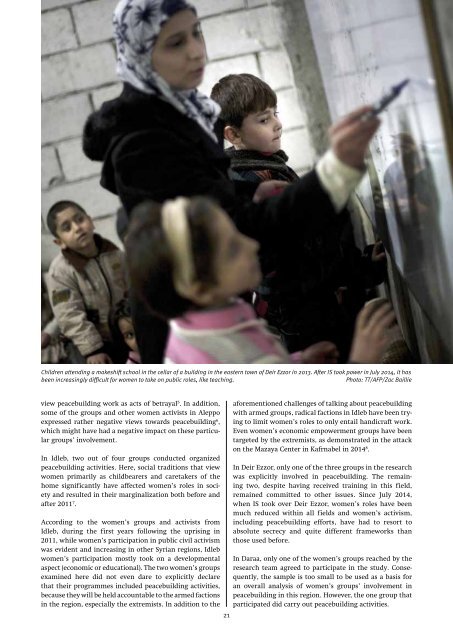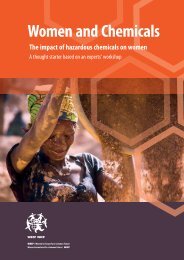future now”
YAO19
YAO19
Create successful ePaper yourself
Turn your PDF publications into a flip-book with our unique Google optimized e-Paper software.
Children attending a makeshift school in the cellar of a building in the eastern town of Deir Ezzor in 2013. After IS took power in July 2014, it has<br />
been increasingly difficult for women to take on public roles, like teaching. <br />
Photo: TT/AFP/Zac Baillie<br />
view peacebuilding work as acts of betrayal 5 . In addition,<br />
some of the groups and other women activists in Aleppo<br />
expressed rather negative views towards peacebuilding 6 ,<br />
which might have had a negative impact on these particular<br />
groups’ involvement.<br />
In Idleb, two out of four groups conducted organized<br />
peacebuilding activities. Here, social traditions that view<br />
women primarily as childbearers and caretakers of the<br />
home significantly have affected women’s roles in society<br />
and resulted in their marginalization both before and<br />
after 2011 7 .<br />
According to the women’s groups and activists from<br />
Idleb, during the first years following the uprising in<br />
2011, while women’s participation in public civil activism<br />
was evident and increasing in other Syrian regions, Idleb<br />
women’s participation mostly took on a developmental<br />
aspect (economic or educational). The two women’s groups<br />
examined here did not even dare to explicitly declare<br />
that their programmes included peacebuilding activities,<br />
because they will be held accountable to the armed factions<br />
in the region, especially the extremists. In addition to the<br />
21<br />
aforementioned challenges of talking about peacebuilding<br />
with armed groups, radical factions in Idleb have been trying<br />
to limit women’s roles to only entail handicraft work.<br />
Even women’s economic empowerment groups have been<br />
targeted by the extremists, as demonstrated in the attack<br />
on the Mazaya Center in Kafrnabel in 2014 8 .<br />
In Deir Ezzor, only one of the three groups in the research<br />
was explicitly involved in peacebuilding. The remaining<br />
two, despite having received training in this field,<br />
remained committed to other issues. Since July 2014,<br />
when IS took over Deir Ezzor, women’s roles have been<br />
much reduced within all fields and women’s activism,<br />
including peacebuilding efforts, have had to resort to<br />
absolute secrecy and quite different frameworks than<br />
those used before.<br />
In Daraa, only one of the women’s groups reached by the<br />
research team agreed to participate in the study. Consequently,<br />
the sample is too small to be used as a basis for<br />
an overall analysis of women’s groups’ involvement in<br />
peacebuilding in this region. However, the one group that<br />
participated did carry out peacebuilding activities.



